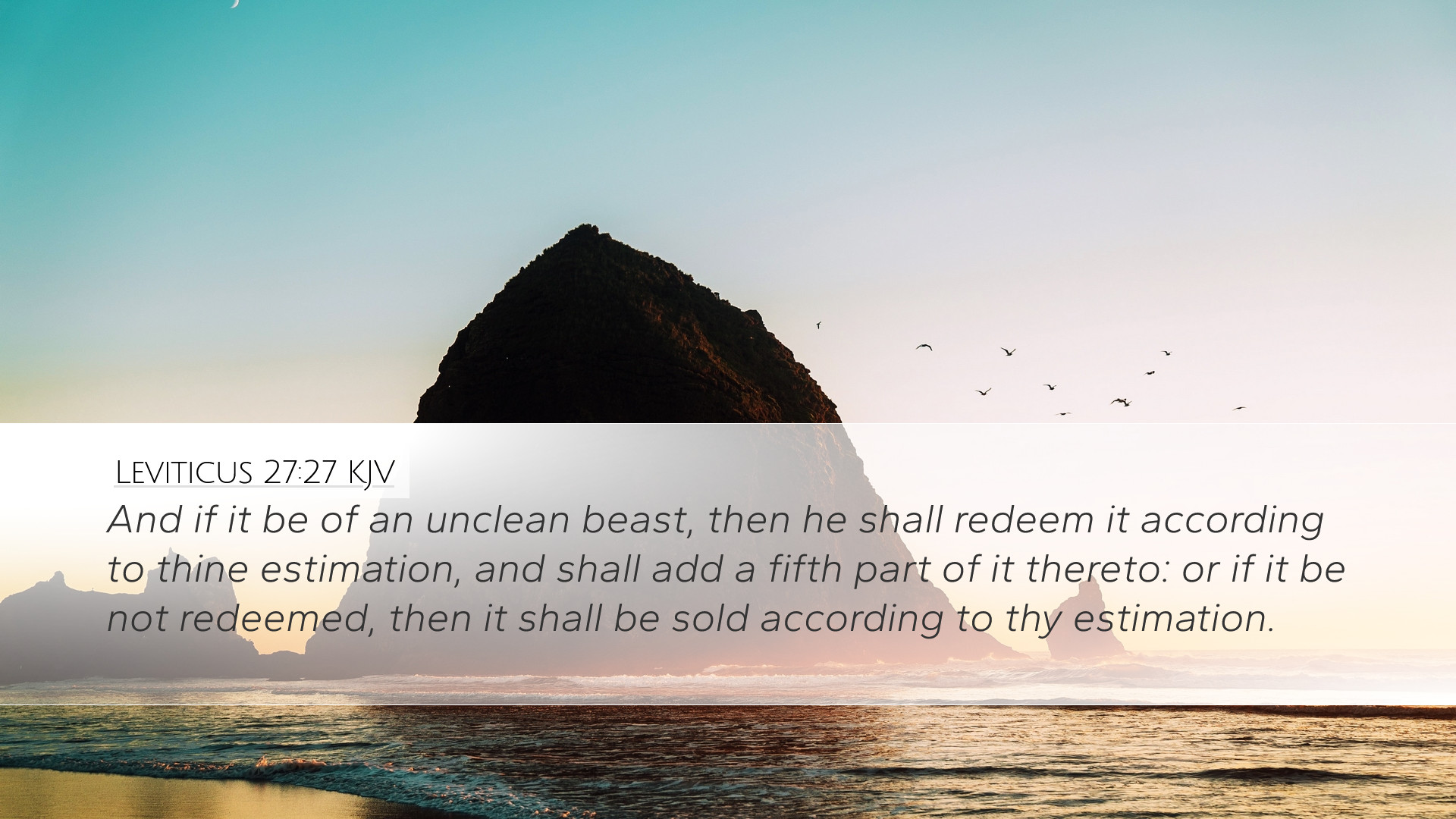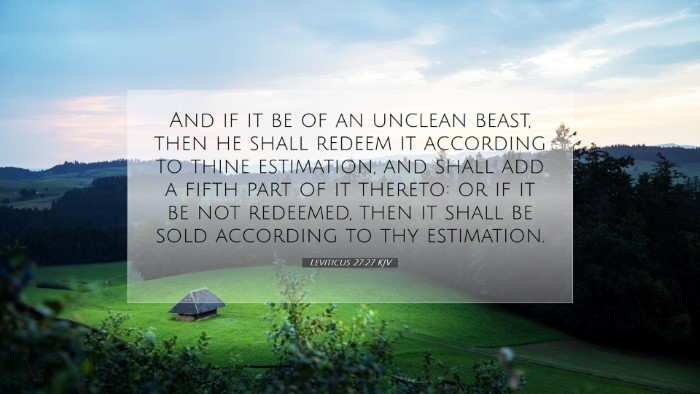Commentary on Leviticus 27:27
Verse Context: Leviticus 27:27 states, "And if it be of an unclean beast, then he shall redeem it according to thine estimation, and shall add a fifth part of it thereto." This verse is part of the laws concerning dedication to the Lord, particularly focusing on the valuation of persons and things dedicated, with specific attention to what is deemed clean and unclean according to Mosaic Law.
Understanding the Verse
This verse addresses the principles of redemption concerning unclean animals dedicated to the Lord. According to the legal system presented in Leviticus, clean and unclean animals held specific status; clean animals could be sacrificed, while unclean animals could not be presented to the Lord as offerings.
Insights from Public Domain Commentaries
Matthew Henry's Commentary
Matthew Henry provides valuable insight into the overarching theme of redeeming what is dedicated to God. He emphasizes the notion of valuation based on the state of being clean or unclean.
- Value of Redemption: Henry highlights that even unclean animals have significance in the redemptive process. The act of valuation serves a greater purpose in the acknowledgement of God's holiness.
- Spiritual Application: Henry points out that this text reflects God's careful account of what is sacred and indicates that nothing unclean can be taken into God's presence without appropriate redemption.
- Reflection on Dedication: The commentary suggests that individuals must consider what they dedicate to the Lord, ensuring it's aligned with His holiness.
Albert Barnes' Notes on the Bible
Albert Barnes offers a systematic approach to understanding the significance of the valuation process in Leviticus 27.
- Legislative Context: Barnes elucidates that these passages are rooted in the legalistic context of Israel. The directive to redeem unclean animals underlines the distinction between belong to God in a clean and acceptable manner.
- The Addition of One Fifth: The requirement to add a fifth part to the valuation emphasizes the premium of sacrifice and dedication, suggesting that God requires a greater commitment from His people.
- God’s Standards: Barnes stresses that the Lord's standards reflect His character and remind believers that they are called to present their best offerings, which aligns closely with the teachings of New Testament grace.
Adam Clarke’s Commentary
Adam Clarke provides a deeper theological exploration into the redemptive value and implications of the verse.
- Cultural Importance: Clarke notes that within the ancient Israelite culture, animals were highly esteemed, and thus their redemption was of paramount significance. The requirement for redemption aligns with the understanding of the sacred nature of offerings.
- Symbolic Meaning: The interpretation of unclean animals represents anything deemed unworthy or impure that requires redemption. Clarke eloquently links this to the necessity for believers to seek purification and redemption through Christ.
- Emphasis on Intent: Clarke highlights that the intent behind the dedication matters. It is not merely transactional; the heart's disposition plays a crucial role in one's offerings to God.
Theological Themes
Several prevailing theological themes emerge from Leviticus 27:27, reinforcing God’s expectations toward holiness and redemption.
- Holiness: The distinction between clean and unclean points to God's holiness. Believers are called to recognize the purity required in their worship and offerings to God.
- Redemption: Redemption becomes a thread that connects the Old Testament practices of sacrifice and the New Testament understanding of Christ’s sacrifice for humanity's sins.
- Value of Offerings: Every offering—clean or unclean—needs to be duly regarded and redeemed to meet God’s standards, which can be applied to various aspects of life and ministry today.
Practical Implications for Today’s Believers
The principles gleaned from Leviticus 27:27 can influence today’s believers in multiple ways:
- Consideration of Offerings: Just as God demanded specific standards of sacrifice, contemporary believers must be thoughtful about what they offer Him and examine the condition of their hearts.
- Embracing Redemption: Acknowledging the unclean aspects in life points to the necessity for redemption through faith in Christ, allowing believers to move from a state of uncleanliness to being made whole.
- Lifestyle of Dedication: This verse inspires believers to live lives that reflect God’s holiness, understanding the gravity of dedicating oneself to God in all aspects.
Conclusion
In summary, Leviticus 27:27 serves as a profound reminder of the intricate relationship between God's law, human offerings, and the principle of redemption. From the insights provided by Matthew Henry, Albert Barnes, and Adam Clarke, it is evident that the way believers approach their dedication to God must be rooted in understanding His holiness and grace. As modern readers engage with this text, they are invited into a deeper reflection on what it means to offer their lives in a manner that is pure and pleasing to the Lord.


